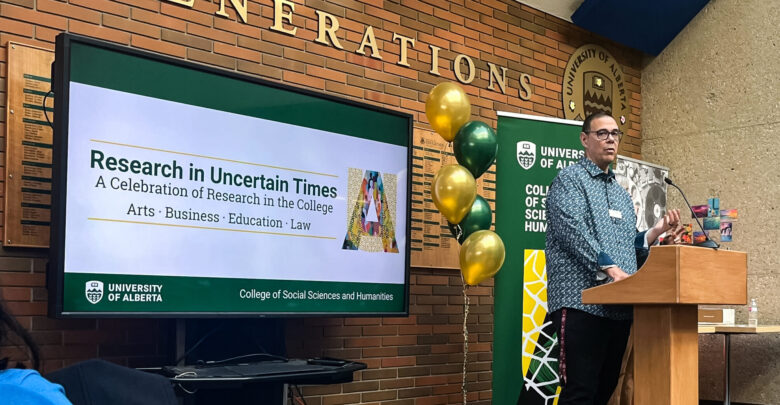Social sciences and humanities college gathers to celebrate research
The University of Alberta received a record amount of funding from the Social Sciences and Humanities Research Council for its research.
 Leah Hennig
Leah HennigThe University of Alberta held its inaugural celebration of research in the college of social sciences and humanities (CSSH).
This celebration came after the U of A received a record amount in grants from the Social Sciences and Humanities Research Council (SSHRC). U of A researchers will receive a total of $8,977,671 in SSHRC grants for the 2025 competition year.
Chris Anderson, the dean of CSSH, said that “events like this remind us why it’s worth slowing down for a moment at a time for what is for most of us a very, very busy time of the semester.”
“Events like this are a good reminder to pause and recognize the imagination, the creativity, and the expertise that define the [CSSH] of the [U of A],” he said. “The [CSSH] matter because they help us not only ask how the world works but why the world works.”
“They show people how to build communities, how to make meaning, and how to negotiate the values tat hold societies together, and sometimes tear them apart,” Anderson said.
He mentioned the range of research in the CSSH, which includes KGB file histories of Indigenous Peoples, teacher well-being, comics, and eye tracking.
“Within the college, that work is broad and deep,” he said. “Our scholars and students are found in every corner of the world, working across more than a dozen disciplines. They use methods as varied as archival and ethnographic research, artist creation, storytelling, and community-based inquiry, and data-driven analysis.”
Anderson said the CSSH’s impact is visible in the recent success with SSHRC grants.
“These successes are thus not only about numbers alone … they represent partnerships with communities, collaborators, and institutions that share our commitment to advanced knowledge for the public good.”
“Your work is more important than ever,” vice-president of SSHRC says
Sylvie A. Lamoureux, the vice-president (research) at SSHRC, was present and spoke at the event.
She said she knew of the U of A as world-leading in its work in pedagogy and student experience in education. But since becoming a vice-president with SSHRC, she’s “discovering really the depth and breadth of the [CSSH] and interdisciplinary research led by your colleagues.”
Lamoureux noted that 96 colleagues from the U of A participated in SSHRC’s merit review in 2024, a number that is unusually high for most universities. For the U of A, however, the number has consistently been in the 90s.
“If we really want to ensure research excellence, it starts and ends with the quality of the peer review, and we could not do that without you,” she said. “You help us ensure the highest standards as the foundation to what we do.”
She expressed that while she has “no more money to give,” she is looking at ways to better recognize the U of A’s contributions.
Additionally, SSHRC is working to better understand how to work towards reconciliation and how to address issues of racism within SSHRC’s programs.
“Your work is more important than ever to help Canada, Canadians, but also the world in these challenging times,” Lamoureux added.




